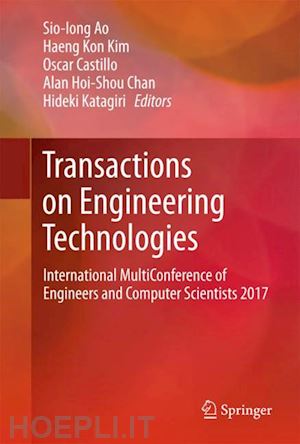
Questo prodotto usufruisce delle SPEDIZIONI GRATIS
selezionando l'opzione Corriere Veloce in fase di ordine.
Pagabile anche con Carta della cultura giovani e del merito, 18App Bonus Cultura e Carta del Docente
This volume contains a selection of revised and extended research articles written by prominent researchers participating in the 25th International MultiConference of Engineers and Computer Scientists (IMECS 2017) which was held in Hong Kong, 15-17 March, 2017. Topics covered include electrical engineering, communications systems, engineering mathematics, engineering physics, and industrial applications. With contributions carefully chosen to represent the most cutting-edge research presented during the conference, the book offers the state of art in engineering technologies and physical science and applications, and also serves as an excellent reference work for researchers and graduate students working with/on engineering technologies and physical science and applications.
1 transportation safety improvements through video analysis: an application of obstacles and collision detection applied to railways and roads.- 2 it-security concept cornerstones in industrie 4.0.- 3 further in-depth investigation of precuing effect on tracking and discrete dual-task.- 4 improvement of maximum production in the batch transesterification reactor of biodiesel by using nonlinear model based control.- 5 production scheduling tools to prevent and repair disruptions in MRCPSP.- 6 a supply chain design of perishable products under uncertainty.- 7 the relationships between education level, income level and prior experience, and the attitude of college students about online shopping in hong kong.- 8 risk mitigation strategy for public private partnership (ppp) of airport infrastructure development in indonesia.- 9 an experimental study of adhesion between aggregate minerals and asphalt binders using particle probe scanning force microscopy.- 10 approaches to a descent underwater vehicle stabilization in conditions of a sea disturbance.- 11 a comparison of different quasi-newton acceleration methods for partitioned multi-physics codes.- 12 implementation of international safety standard en iso 13849 into machinery of tyre industry.- 13 investigation on bidirectional dc/dc converters for energy management and control.- 14 distributed lock relation for scalable-delay-insensitive circuit implementation based on signaltransition graph specification.- 15 a neural network based soft sensors scheme for spark-ignitions engines.- 16 a tourist spot search system based on paragraph vector model of location and category tags using user reviews.- 17 learning method of fuzzy inference systems for secure multiparty computation.- 18 solving the fagnano's problem via a dynamic geometry approach.- 19 an innovative approach to video based monitoring system for independent living elderly people.- 20 color blindness image segmentation using rho-theta space.- 21 estimation ofglobal image threshold based on statistical change-point detection.- 22 automated computer vision system based on color concentration and level for product quality inspection.- 23 applied finite automata and quadtree technique for thai sign language translation.- 24 improvement method for topic-based path model by using word2vec.- 25 how to find similar users in order to develop a cosmetics recommender system.- 26 applied finite automata and quadtree technique for thai sign language translation.- 27 historical event-based story creation support system for fostering historical thinking skill.- 28 japanese-chinese cross-language entity linking adapting to user's language ability.
Dr. Sio-Iong Ao finished his doctoral research in The University of Hong Kong and postdoctoral researches in the University of Oxford and Harvard University and is a former visiting professor of Cranfield University, UK and University of Wyoming, USA.
Dr. Haeng-Kon Kim is currently a Dean of engineering college and a professor in the Department of Computer Engineering Catholic University of Daegu, in Korea. He has been a research staff member in Bell Lab. and NASA center in U.S.A. He has taught in Central Michigan Univ. in U.S.A. during his Sabbatical (Dec., 20, 2000 ~ Feb., 20,2002).
Prof. Oscar Castillo is a Professor of Computer Science in the Graduate Division, Tijuana Institute of Technology, Tijuana, Mexico. Prof. Castillo serves as Research Director of Computer Science and head of the research group on fuzzy logic and genetic algorithms, and is President of HAFSA (Hispanic American Fuzzy Systems Association) and Vice-President of IFSA (International Fuzzy SystemsAssociation). Prof. Castillo is also Vice-Chair of the Mexican Chapter of the Computational Intelligence Society (IEEE).
Dr Alan H.S. Chan obtained his BSc, MPhil, and PhD from the University of Hong Kong. He has a wide range of research interests in human factors, work design, and occupational safety and health and has published more than 160 papers in SCI journals. He has been contributing to his profession and was elected as a Fellow of Institute of Industrial and Systems Engineers, International Ergonomics Association, Hong Kong Institution of Engineers, Institution of Engineering and Technology, and the Hong Kong Ergonomics Society. Dr Chan was the President of Institute of Industrial Engineers (HK) for 96/97 and twice the President of Hong Kong Ergonomics Society (03-05, 09-11).
Prof. Hideki Katagiri is a Professor of Department of Industrial Engineering and Management at Kanagawa University, Japan. He is also a Visiting Professor of Hiroshima University, Japan. Hisresearch and teaching activities are in the area of Operations Research and Computational Intelligence such as Mathematical Optimization under Uncertainty, Soft Computing and Data Analysis.











Il sito utilizza cookie ed altri strumenti di tracciamento che raccolgono informazioni dal dispositivo dell’utente. Oltre ai cookie tecnici ed analitici aggregati, strettamente necessari per il funzionamento di questo sito web, previo consenso dell’utente possono essere installati cookie di profilazione e marketing e cookie dei social media. Cliccando su “Accetto tutti i cookie” saranno attivate tutte le categorie di cookie. Per accettare solo deterninate categorie di cookie, cliccare invece su “Impostazioni cookie”. Chiudendo il banner o continuando a navigare saranno installati solo cookie tecnici. Per maggiori dettagli, consultare la Cookie Policy.